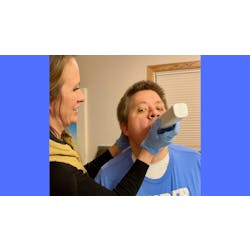By Mark Hartley
I met Susanne Kuehl several years ago when she was the professional relations manager for a consumer oral care company. I'm not Einstein, and I certainly hope I don't pretend to be. I also know there are certain aspects of dental hygiene that I will never fully understand regardless of how many articles I read on the topic.
Five minutes into my first conversation with Susanne, I knew I needed to be on my toes. She was, uh, cerebral. Our conversation was not the first or last time I have felt intellectually challenged by a dental hygienist. But Susanne has a way of making you see the big picture; if you want to take a look, you have to pull the brain out of neutral, which seems to be where my brain is sometimes stuck.
Susanne is being honored in this issue as the Philips Sonicare/RDH Mentor of the Year. She told Cathy Seckman that she agrees "with Epictetus, who said, 'The key is to keep company only with people who uplift you, whose presence calls forth your best.'"
Kind of gives you a clue, doesn't it? Can you see me in that hallway meeting her for the first time, perhaps scratching my noggin while wondering who Epictetus is? I hope she doesn't mind, but, before writing this, I looked up her education background on her LinkedIn profile, half expecting to discover that Harvard or Yale offered dental hygiene degrees back in the day (not that her degrees from Daniel Webster College and the University of New England are anything to sneeze at).
I don't think she would mind being described as at least somewhat political. Some of her quotes as told to Seckman indicate a strong support and passion for political issues pertaining to dental hygiene. The local administrators of dental hygiene associations have benefited greatly from her mentoring them. The "legislative liaisons" often have nothing but their wits when facing the well-oiled political machines of organized dentistry about access-to-care issues. The hygienist who nominated her explained that Susanne was an "incredible mentor" who "gently nudged" her along a path of creating better access for the underserved. I applaud the decision of the judges (previous recipients of the award) for selecting Susanne Kuehl as the 2014 Mentor of the Year, and I remain grateful to Philips for its support of mentoring in the dental hygiene profession.
Speaking of cerebral, I think it is probably a no-brainer that high incomes in dental hygiene are often in states where it's more expensive to live. Nevertheless, salary surveys tend to propel us along the lines of "Gee, I could be making twice as much if I lived somewhere else." Urban areas in a couple of western states, for example, do approach six figures for annual incomes for dental hygienists. Hygienists in these cities, of course, do not need to flout their income as a measure of professionalism. It can't hurt, though, the public perception of a health-care profession if it earns six figures.
As we know from the salary surveys, however, the lack of benefits, living expenses, and employers who circumvent rising salaries by creating part-time positions kind of get in the way of being able to say, "I have a buddy who knows a buddy in Seattle/San Francisco/Los Angeles who makes six figures as a dental hygienist."
The federal government was somewhat muted with its outlook for the dental hygiene profession in its update last January. The Bureau of Labor Statistics continues to emphasize the positive: "Employment of dental hygienists is projected to grow 33% from 2012 to 2022, much faster than the average for all occupations."
But the BLS also pointed out that "more than half of dental hygienists work part time," and "some dental hygienists receive benefits."
The Bureau of Labor Statistics also played a key role in an article developed for DentistryIQ.com. Along with a few other resources, we compared dental hygiene salaries with living expenses, taxes, and real estate values in 100 U.S. cities, grading those cities for being a good place for a dental hygienist or dental assistant to live on their incomes.
The article can be viewed at:
www.dentistryiq.com/articles/2014/03/income-power-of-hygienists-and-dental-assistants-in-100-us-cities.html
As stated above, it turned out to be a no-brainer that the high incomes in popular career destinations struggle to offer more income flexibility (such as saving or making large purchases like a house) than in cities where hygienists earn less. But it was good to see the statistics on paper.
Mark Hartley
[email protected]
Follow RDH on Facebook
Past RDH Issues




